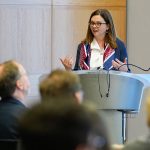
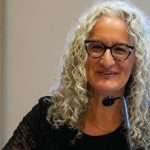
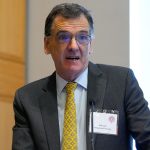
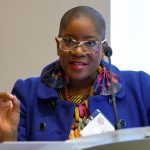
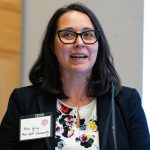
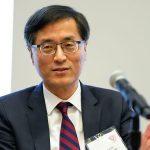
Fordham hosted a wide-ranging, multi-disciplinary conference on May 1 and 2 at the Lincoln Center campus that addressed the sources of environmental degradation, racism, ableism, and rising inequality with regard to access to resources and information around the world.
In her welcoming remarks at the International Conference on Social and Environmental Justice, Fordham President Tania Tetlow noted that the conference’s goals were perfectly in sync with the four apostolic preferences of the Society of Jesus.
They are “walking with the excluded,” “caring for our common home,” “journeying with youth,” and committing to discernment, or “doing it all with openness and humility by listening and learning,” she said.
“My hope is that you will energize and inspire each other, that we will come up with the sorts of solutions that lie in the complexity, ” she said.
“And that we do it in a way that models that for our students because that is all about where we can locate the hope.”
The conference, which was organized by Fordham’s Office of the Provost, Office of Research, and Office of the Chief Diversity Officer, was supported by Fordham, Columbia University, Georgetown University, and New York University. Additional funding was provided by Fordham’s Office of the Chief Diversity Officer.
Ten-panel discussions followed two keynote addresses by Molly Doane, Ph.D., associate professor of anthropology at the University of Illinois-Chicago, and Alex Gil, Ph.D., senior lecturer II and associate research faculty at Yale University.
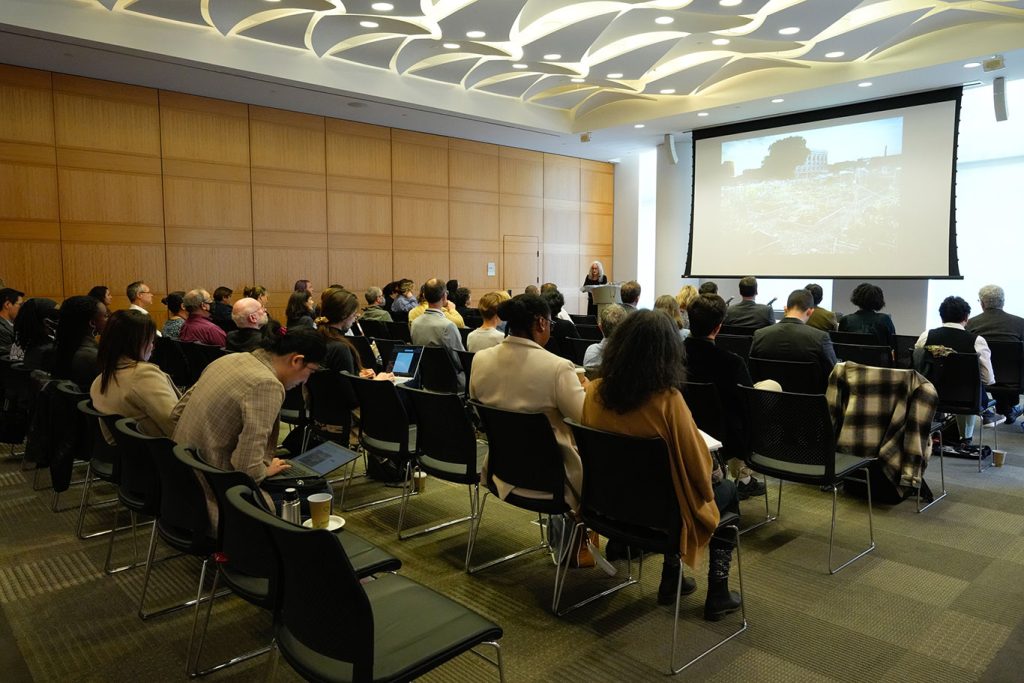
Community Gardens and Food Justice
Doane shared stories of working with three community gardens on the west, north, and south sides of Chicago, in a lecture titled “Climate Stories: Gardening at the City’s Edge in Chicago.” Far from simply being spots for food production, she said the gardens are beacons of hope for marginalized communities, including refugees from Iraq.
The Hello Howard Community Garden, where she is a member, contributes produce to a local food bank, even though yields can be uncertain.
“We gardeners donate to refugee programs for the same reason we flew to Lesbos to sort donated clothing in a warehouse after seeing a picture of that sweet little boy washed up on the shore there, the same reason we hang the ‘Hate Has No Home Here’ signs and the reason we flocked to O’Hare after refugees were detained after Trump signed the Muslim ban,” she said.
“I work in food not because it’s the be-all, end-all. It’s because it’s a tool to dismantle racism and create some racial equity and create living, thriving economies that people can control and have some sovereignty”
Minimal Computing and Access to Technology
In “Minimal Computing and Environmental Justice: A Humble Offering,” Gil shared the ways in which digital projects such as Open Syllabus, which has collected and analyzed 7.2 million college syllabi, and WAX, which helps researchers create digital archives, are making it easier to empower people who don’t have the same access to technology that is common in the United States, Europe, and Asia.
Minimal computing, which is a way of developing technology that can be used in the absence of hardware, software, network capacity, technical education, or even a reliable power grid, is one option.
“How do we do design if we don’t take for granted that everyone has fast, free internet, no censorship, and electricity all the time?” he said.
“Minimal computing tries to imagine constraints all over the world and designs for it.”
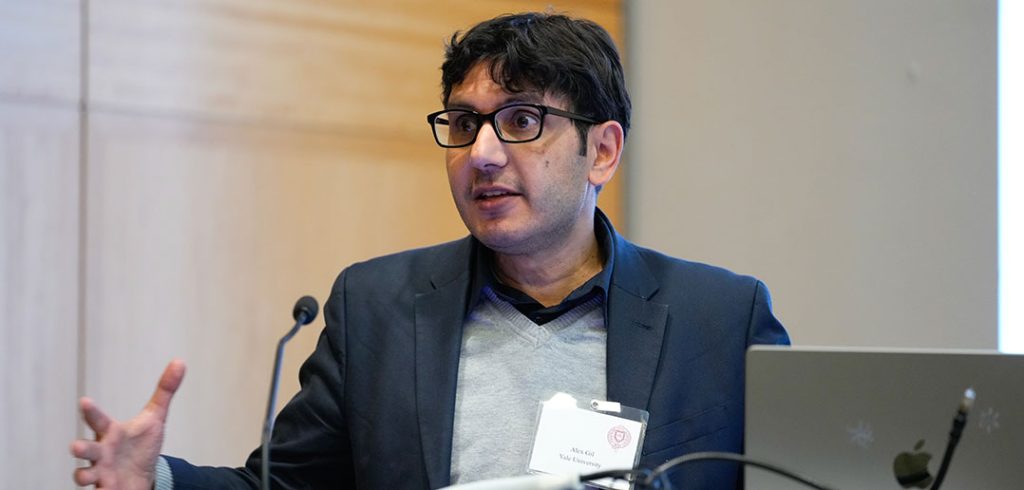
Environmental Economics, Justice, and Policy
In the panel Environmental Economics, Justice, and Policy, R. Jisung Park, Ph.D., assistant professor of economics at the University of Pennsylvania, showed how the increase in 90-degree days presents a greater risk of heat-related injuries than previously thought to those who work in jobs outside, as well as some who work in manufacturing.
Beia Spiller, director of the Transportation Program at Resources for the Future, made the case for greater public funding for electric vehicle charge stations in the Bronx.
And Marc N. Conte, Ph.D., a professor of economics at Fordham, shared the findings of a forthcoming paper, “Observational studies generate misleading results about health effects of air pollution: evidence from chronic air quality conditions and COVID-19 outcomes”. His study aimed to address the fact that in New York City, Black residents succumbed to COVID-19 in greater numbers than white residents.
Since the areas of the city where they live feature high ambient concentrations of air pollution, Conte wanted to see whether the two facts were connected. He concluded they are not, in part by analyzing phone data that showed that white, wealthy residents of the Upper East Side, which has similar levels of air pollution, may have been spared because they simply left the city during the pandemic.
“I’m not saying that Black and brown communities were not adversely affected by COVID. What I’m saying is, it wasn’t because they lived necessarily in areas with worse air quality,” he said.
“[P]eople in these communities had jobs that forced them to work in person. So they were actually here and present and exposed to this virus in a way that people in wealthier, whiter communities were not. I think that’s actually a larger systemic racism problem than an air quality issue.”
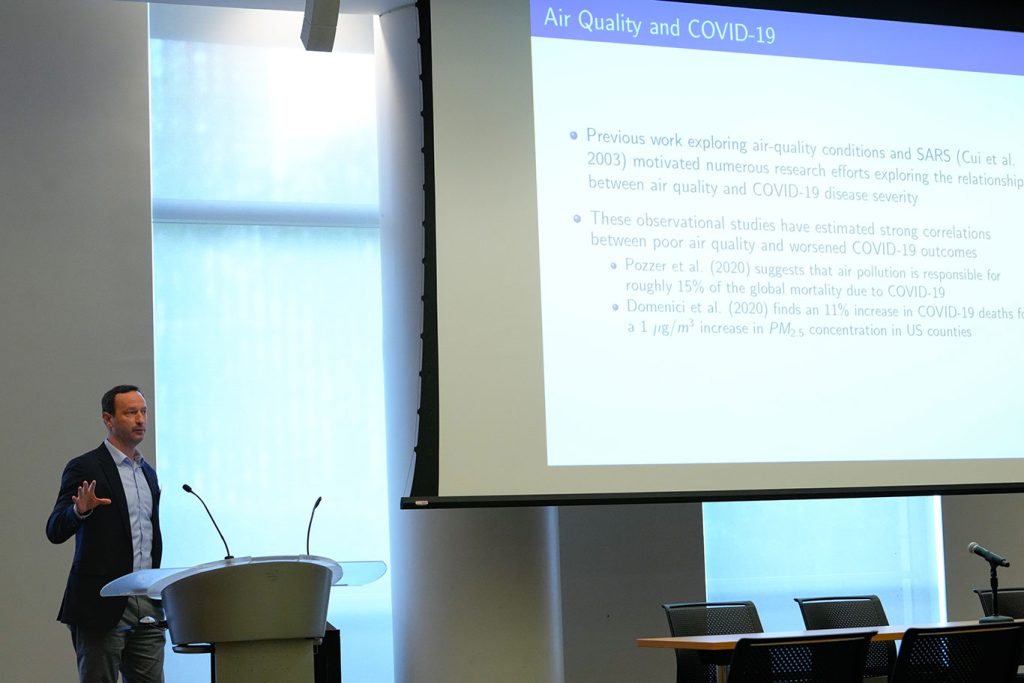
In the closing session, George Hong, Ph.D., Chief Research Officer and Associate Vice President for Academic Affairs at Fordham, hailed the gathering for bringing together perspectives from 13 different countries, representing nonprofit government organizations, academia, community groups, and private industry. Fordham has also been invited to publish the research presented in an upcoming issue of the academic journal Social Sciences.
The final session also featured remarks from Fordham professors Steven Franks, Ph.D., Nicholas Paul, Ph.D., Aseel Sawalha, Ph.D., and Sophie Mitra, Ph.D.
Franks highlighted the fact that so many participants conducted research in partnership with community organizations.
“This is getting out of the colonialist, or post-colonial mindset of sort of sweeping in to solve the problems of those people, and really just working with local communities to find out how we can all benefit from each other and solve problems together,” he said.
]]>“It still gives me chills to think about what a moment that was. It was … taking ownership of this term, rather than it being used to demean or marginalize her, that gave people a framework to understand her. And so she shifted from being somebody that was enigmatic or strange to somebody who was a person with autism who wasn’t ashamed of having autism,” he said on April 4 in an online lecture.
Grinker, an award-winning professor of anthropology and international affairs at George Washington University and an expert on autism and mental illness, was the main speaker at the 2021/2022 Fordham Distinguished Lecture on Disability. His book Unstrange Minds: Remapping the World of Autism (Basic Books, 2008), inspired by Isabel, won the 2008 National Alliance on Mental Illness KEN award.
In his speech, he shared the most critical findings from his newest book, Nobody’s Normal: How Culture Created the Stigma of Mental Illness (W.W. Norton, 2021). He argues that the main cause of stigmatization against those with mental illnesses and disabilities is something that we don’t often consider—the social, cultural, and historical contexts in which we live.
‘The Ideal Person’: How American Society Became Divided
Over the past two decades, disabilities have been increasingly embraced as part of being human, rather than something shameful and frightening, said Grinker. He said he witnessed this transformation in Isabel, who is now 30, as well as his students. On the first day of class in front of nearly 300 peers, a student announced that he had Tourette syndrome, Grinker recalled, because he wanted his peers to understand the reason behind his unusual behavior.
Grinker said that society is becoming less judgmental. Increasing education and public awareness have contributed to this, he said, but what primarily shapes our stigmas against those who are “different” are the social, cultural, and historical contexts in which we live.
Capitalism, for example, created conditions that led to stigmatization. The ideal American possessed two traits that were central to capitalism: independence and autonomy. Those who lacked those traits—or were unable to possess them—were viewed as “abnormal,” he said.
“Our judgments about mental illnesses come from our definitions of what, at different times and places, people consider the ideal society—the ideal person,” Grinker said, adding that we are now moving away from the definition of an ideal person as defined by capitalism.
He also drew attention to a phenomenon that helped to destigmatize mental illness and disabilities: war.
During World War II, an unprecedented number of people suffered from mental illness. In response, U.S. President Harry Truman established the National Institute of Mental Health and ordered the military to create a manual used for the diagnosis of mental disorders.
To Be Normal Is To Be ‘Boring’
Many people aspire to be “normal,” but this mindset is actually a damaging illusion, said Grinker. He recalled a 1951 research study conducted by his father and grandfather, who were both psychiatrists. They studied a group of men who they divided into two groups: those who screened positive for mental illness and those who were “normal.” They found that the latter lacked ambition and creativity. As Grinker put it, they were “boring.”
“What my grandfather and my father were suggesting was that normality was crippling—that some degree of mental illness, some degree of mental difference might be necessary for humanity to remain vibrant, creative, and diverse,” Grinker said.
Humanity’s stigmas can never be completely eradicated—but that doesn’t mean we can’t resist them, he said.
“We only need to look at the kinds of examples that I gave you earlier, whether it’s my daughter, Isabel, or my students, to give us hope,” Grinker said.
The sixth Fordham Distinguished Lecture on Disability was co-organized by the Disability Studies Program and the Research Consortium on Disability and co-sponsored by the Conference of Arts & Science Deans and the Office of Research. The Q&A following the lecture was co-moderated by Sarah Macy, FCLC ’22, a psychology major and disability studies minor who identifies as an autistic woman, and Micki McGee, Ph.D., associate professor of sociology at Fordham and the parent of a neurologically divergent young adult.
Watch a full recording of the lecture below:
]]>The virtual event is hosted by the Office of Research, and will include remarks from George Hong, Ph.D., chief research officer and associate vice president for academic affairs, and Vice Provost Jonathan Crystal, Ph.D.
“The Office of Research decided on this forum’s theme because it ties in closely with one of the two top priorities this year for our office and for the University overall,” Hong said. “The other top issue guiding our priorities is COVID-19 research.”
The forum will feature four presentations from Fordham faculty and students.
Tanya Kateri Hernandez, Archibald R. Murray Professor of Law at the School of Law’s Center on Race, Law & Justice will present her work on “Latino Anti-Black Bias: ‘Racial Innocence’ and the Struggle for Equality.
Jeannine Hill Fletcher, Ph.D., professor of theology, will present her research on “Grace of the Ghosts: Encountering Institutionalized Racism.”
Hrishikesh Vinod, Ph.D., economics professor, and Katherine Theiss, a doctoral student in the Department of Economics, will explore “A Novel Solution to Overcoming Testing Bias in Covid-19 Incidence Studies.”
Xiaofang Liu, a Ph.D. candidate in the Graduate School of Social Service, and a study coordinator at the Columbia Population Research Center, teamed up with Professor Qin Gao, Ph.D, Director of the China Center for Social Policy and professor of social work at Columbia University to present on “Racial Discrimination Against Asian Americans During COVID-19: What Do We Know and What Must Be Done?”
Hong said that he hoped the forum would not only showcase faculty work internally but also help raise their profiles.
“Our desired takeaways for those attending are three-fold—first, we hope our speakers will raise awareness of their research on anti-racism across the University,” he said.
“Secondly, we would like to enhance and develop networks for our faculty and student research collaborations on anti-racism. Thirdly, we want to encourage our faculty to seek out and win external grants to support their research in the battle of end racism.”
Those interested in attending can join via Zoom.
]]>The International Symposium on Digital Scholarship took place from June 3 to 5 at Birkbeck College and Fordham’s London Centre. Sponsored by the University’s Office of Research, it featured a mix of lectures, workshops, and formal and informal gatherings geared toward furthering research opportunities and international collaborations.
If last year’s gathering illustrated how cross-border collaboration is key to tackling vexing challenges of our time, the London gathering showed how, in the digital realm, no one discipline can go it alone.
Bringing Technology and Scholarship Together
“Digital scholarship is notable for its interdisciplinary nature, since it involves not only IT and computer science, but also the humanities, social sciences, and schools of education,” said Maryanne Kowaleski, Ph.D., the academic coordinator for the digital symposium.
The Joseph Fitzpatrick S.J. Distinguished Professor of History and Medieval Studies and curator of Fordham’s Medieval Sources Bibliography, Kowaleski has deep connections to both London and the digital humanities.
In London, she delivered a keynote address, “Giving Credit Where Credit is Due: Acknowledging Collaborative Work in Digital Scholarship Projects.” She also presented a research project that touches on both London and the digital realm, titled “Prosopography, Database Design, and Linked Data in the Medieval Londoners Project.”
The project is a collaboration with Katherina Fostano, visual resources coordinator in the department of Art History, and Kowaleski said it was notable that Fostano presented at the conference, as did Elizabeth Cornell, Ph.D., director of communications at Fordham’s department of information technology. Adding professional staff such as librarians and graduate students to the mix, was key to the conference’s success, she said.
“One of the things that my research shows, and that I have experienced, is how crucial librarians are to digital efforts now. I’m grateful that Fordham has included them in this program,” she said.
London and New York, Working as a Team
Representing the Graduate School of Education (GSE), Professor of Childhood Special Education Su-Je Cho, Ph.D, and doctoral student Kathleen Doyle jointly presented “Using a Digital Learning Platform to Increase Levels of Evidence-Based Practices in Global Teacher Education Programs.” It detailed Project REACH, a U.S. Department of Education-funded initiative that makes widely available the best evidence-based practices for training prospective teachers.
George Magoulas, Ph.D., Alex Poulovassilis, Ph.D., and Andrea Cali, Ph.D., members of Birkbeck College’s Knowledge Lab, helped them collect and analyze data through the website.
Working with a partner in London made sense for this project, Cho said, because one of her goals is for Project REACH to get more use internationally. She, Doyle, and the GSE’s Alesia Moldavan, Ph.D., assistant professor of mathematics education, will collaborate with Christine Edwards-Leis, Ph.D., associate dean of research, and enterprise and doctoral student Jennifer Murray from St. Mary’s College in London on a new endeavor geared toward student teachers’ mental health. Once finished, it will be incorporated into Project REACH.
“The student teaching experience is very stressful, because it’s not their own classroom they have to student teach in. It’s someone else’s classroom. By providing this kind of platform, they can also share their concerns and knowledge and frustrations with the students overseas,” she said.
For Doyle, the trip was an opportunity to see how colleagues from other disciplines assemble collaborative teams.
“I really appreciated learning across the fields. Being in the Graduate School of Education, I’ve been mainly focused on that field. It was refreshing to hear about the other ways digital scholarship is utilized in other disciplines,” she said.
Urban Challenges That Cross Borders
Gregory T. Donovan, Ph.D., assistant professor of communication and media studies, presented “Keeping Place in ‘Smart’ Cities: Situating the Settlement House as a Means of Knowing and Belonging in the Informational City.” The project, which he is developing with the assistance of Melissa Butcher, Ph.D., reader in social and cultural geography at Birkbeck College, will highlight the efforts of New York City’s Lincoln Square Neighborhood Center and London’s Toynbee Hall.
The project will focus on the “settlement house” model of community center that was founded a century ago to confront segregation and displacement and promote belonging.
“New York City and London are examples of global cities that are going through significant technological change, both in terms of the cities themselves becoming more digitized as well as the economy and the kinds of jobs and the kinds of education that’s being elevated. With that comes all kinds of difficult changes and gentrification that causes displacement,” said Donovan, who is also organizing November symposium at Fordham called Mapping (in)justice.
“We’re going to look at how we might network [Lincoln Square and Toynbee] through digital technology and think about how they’re managing to keep pace in these communities that are often being displaced in this kind of digital gentrification.”
]]>Photos by Bruce Gilbert
Six distinguished faculty members were honored on March 13 for their achievements in securing externally funded research grants at the third annual Sponsored Research Day on the Rose Hill campus.
The University Research Council and Office of Research presented the Outstanding Externally Funded Research Awards (OEFRA) to recognize the high quality and impact of the honorees’ sponsored research within the last three years and how their work has enhanced Fordham’s reputation—both nationally and globally.
Faculty were honored in five separate categories and were given awards by Jonathan Crystal, Ph.D., interim provost, associate vice president, and associate chief academic officer.
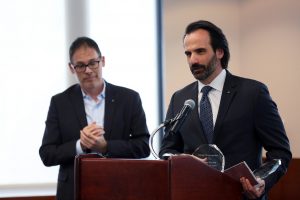
Humanities: George Demacopoulos, Ph.D., professor of theology and the Father John Meyendorff & Patterson Family Chair of Orthodox Christian Studies, and Aristotle Papanikolaou, Ph.D., professor of theology and the Archbishop Demetrios Chair in Orthodox Theology and Culture
Demacopoulos and Papanikolaou, co-directors of Fordham’s Orthodox Christian Studies Center, shared the award for the Humanities category. Demacopoulos has received awards totaling $928,000 in the past three years, while Papanikolaou has received a total of $888,000. Last April, they secured two grants totaling $610,000 that will be used to fund a multiyear research project devoted toward the issue of human rights.
Interdisciplinary Research: Su-Je Cho, Ph.D., Associate Professor of Childhood Special Education at the Graduate School of Education.
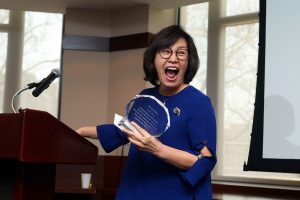
Cho, an expert in the field of special education, has received two external grants totaling more than $2.7 million from the U.S. Department of Education and other foundations in the past three years. Her interdisciplinary project will produce approximately 40 professionals in special education and school psychology, which are the greatest shortage areas in the field of education.
Junior Faculty Research: Sarit Kattan Gribetz, Ph.D., Assistant Professor of Theology
Gribetz has received six external grants totaling $55,000 from the prestigious National Endowment for Humanities and other foundations in the past three years. Her research focuses on the history of time in antiquity and the important role that religious traditions and practices have played in the history of time. In 2017, she received the Manfred Lautenschlaeger Award for Theological Promise, alongside nine other young scholars, from the University of Heidelberg in Germany.
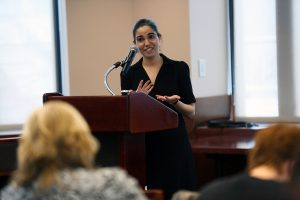
Sciences: Steven Franks, Ph.D., Professor in Biological Sciences
Franks has received five grants totaling more than $5.3 million from the National Science Foundation in the past three years. The results of the studies funded by these grants have been published in 17 peer-reviewed scientific publications since 2016. The papers, which are in high impact journals such as Evolution, Molecular Ecology, and American Journal of Botany, have been widely cited. His work has helped to advance our understanding of responses of plant populations to climate change and the genetic basis of these responses.
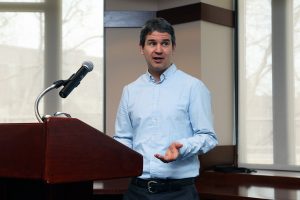
Social Sciences: Janna Heyman, Ph.D., Professor of Social Service and Endowed Chair of the Henry C. Ravazzin Center on Aging and Intergenerational Studies at the Graduate School of Social Service
Heyman, who is also director of Fordham’s Children & Families Institute center, has received 10 grants totaling more than $3 million from a variety of external foundations in the past three years. Last year, she co-edited, along with Graduate School of Social Service Associate Dean Elaine Congress, D.S.W, Health and Social Work: Practice, Policy and Research (Springer, 2018). She has taught social work research, advanced research, and social welfare policy courses in Fordham’s master of social work program, as well as policy implementation in the doctoral social work program.
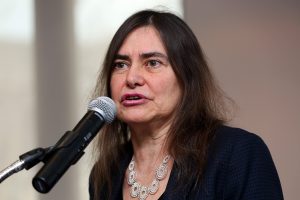
Organized by the Office of Research and the University Research Council and sponsored by the University Research Compliance Council and the Office of Sponsored Programs, the daylong event featuring a keynote speech by Denise Clark, Ph.D., Associate Vice President for Research Administration, University of Maryland at College Park.
A forum of science researchers featured Thomas Daniels, Ph.D., director of the Louis Calder Center, Deborah Denno, Ph.D, director of the Neuroscience and Law Center, Silvia Finnemann, Ph.D., director of the Center for Cancer, Genetic Diseases, and Gene Regulation, J.D. Lewis, director of the Urban Ecology Center, Amy Roy, Ph.D., director of the Pediatric Emotion Regulation Lab, and Falguni Sen, Ph.D., director of the Global Healthcare Innovation Management Center.
]]>Faruque, who was born in Bangladesh and whose interests skewed toward math and science as he was growing up, earned an undergraduate degree in Financial Economics from the University of London in 2011. But he headed back east to Iran shortly afterward, to Tehran University, where he earned an M.A. in Islamic philosophy in 2014. The worldwide financial crash of 2008 had given him pause and spurred him to think about big questions in life.
“The more I was exploring, the more I became convinced that I want to change my field,” he said.
Last year, he earned a Ph.D. in Islamic thought, philosophy, and mysticism (with an emphasis on comparative thought) from the University of California at Berkeley. Since September, he has been the Graduate School of Arts and Science’s (GSAS) first George Ames Postdoctoral Fellow.
A Joint Effort to Expand Recruitment
The fellowship was jointly created by GSAS, the Office of the Chief Diversity Officer, and the Office of Research as a way to advance the recruitment of scholars from underrepresented communities and showcase the value of teaching and research at a Jesuit institution.
It is also partially funded by the George Ames Endowment for Junior Faculty at GSAS, which was created by Ames, a 1942 graduate of the School of Law, the Dean of Arts and Sciences Faculty, and the Office of the Provost.
As part of his two-year-long fellowship, Faruque is working on an expanded version of his Ph.D. dissertation that is forthcoming under the title The Labyrinth of Subjectivity: Islam, Modernity, and the Formation of the Self.
“I used to think, when it comes to things that happen in our life, we can very much control them. Not just what happens in the economic and political sphere, but also in your personal life. I was very confident that I could plan and control every single movement of my life, and progress towards achieving what I wanted to achieve,” he said.
“Eventually I came to realize that all of these matters (i.e. the existential questions) hang together on our conception of selfhood or who we are, which as one medieval philosopher rightly pointed out, is the knot of the universe. Unless we know or understand ourselves fully, we will not be able to understand or make sense of all the phenomena that we observe in the external world.”
A New Concept of the Self
In Labyrinth of Subjectivity, Faruque engages thinkers from Islamic and Western philosophies, as well as leading scholars of neuroscience, to ultimately arrive at a multidimensional conception of the self that is comprised of three degrees: bio-physiological, socio-cultural, and ethico-experiential.
In addition to Western philosophers such as Saint Augustine of Hippo, René Descartes, and Michel Foucault, he includes the contributions of Islamic thinkers such as Yahya ibn Habash Suhrawardi, Avicenna, Mulla Sadra, and Muhammad Iqbal. He tackles the works of neuroscientists such as Antonio Damasio, Walter Freeman, and famed DNA researcher Francis Crick as well, to push back against any notion of the self that is reduced to a series of cognitive abilities such as sensory perception.
“That’s a very narrow conception of the self that ignores the moral dimension. This is because to think of myself as an “I” is to already think of others, as there cannot be an “I” without a “you,” he said.
“I put forward this multidimensional conception of the self that I think would bring new options to the table for addressing some of the central concerns in the modern world, such as the nature of happiness and suffering, transhumanism, and especially, the nature of the ethical life.”
Going Beyond Stereotypes of Islam
The Ames fellowship is open to all departments; J. Patrick Hornbeck II, Ph.D., chair of the theology department, said he was honored that his is the first to host it.
“It’s very clear that understanding Islamic thought is a key goal for many of our students. Many of them are Muslim themselves, others are pursuing majors like Middle Eastern studies or political science or international studies, where a knowledge of Islam that goes deeper than just stereotypes is absolutely essential in order to think about how to build a more peaceful and constructive world,” he said.
“What Muhammed is able to do is not just provide excellent teaching in classic Islamic texts, but also to think about ways in which Islam as a tradition has encountered modern thought in all of its complexity.”
After teaching Faith and Critical Reason last semester, Faruque’s teaching Classic Islamic Text: From the Quran to the Islamic Humanities this spring; next fall he’ll be teaching a course titled Religion and the Making of the Self.
“I really enjoyed teaching my first semester. The students were very engaging. It was very much a discussion-oriented class, and I’m someone who always enjoys dialogue rather than just lecturing,” he said.
Fordham’s Jesuit roots were appealing as well, Faruque said, as he had incorporated St. Ignatius’ Spiritual Exercises into his dissertation. He also appreciates that the University’s approach to education is holistic, rather than fragmentary.
“Teaching does not just end in class or with a course that you teach. What’s much more important is the life that is about to come, and the skills that [a student]is supposed to acquire through her time in this kind of institution,” he said.
“You do address enduring questions of human experience, and equip students to think critically, to develop practical skills for constructive intellectual dialogue across religious, cultural, and political divide, and to know one’s place in the wider world, which is essential for engagement in shifting national and global contexts. As a critical educator, I have found that anchoring diverse intellectual thought promotes greater cross-cultural learning and understanding, in addition to helping develop a global consciousness in the classroom.”
]]>“This is a great opportunity for Fordham faculty, particularly in light of the increasing emphasis in many disciplines on interdisciplinary, multi-institution research projects,” said J.D. Lewis, Ph.D., chair of the University Research Council.
“The research fellows program nicely complements the ongoing opportunities faculty have through the Bronx Science Consortium, providing faculty with opportunities to develop collaborations that move their research in new directions.”
Faculty members who are interested in the program must submit nominations and self-nominations to the dean of the school of their affiliation by January 30. By March 1, deans from each school will submit their nominations to Z. George Hong, Ph.D., chief research officer and associate vice president for academic affairs.
Fellows will be announced by April 1.
The fellowship will commence on May 15 and continue through August 15, 2017.
In addition to being full-time tenure-track or tenured faculty members, applicants should have demonstrable success in conducting research and strong credentials, including grant activities and publications. Applicants are also required to have a plan for collaborating with a Columbia scholar using resources provided by that scholar either independently or in conjunction with a Columbia research institute.
Benefits include access to Columbia’s research facilities, equipment and workspaces and up to $5,000 in support of the fellow’s professional development and scholarly activities from the Office of Research at Fordham.
After completing the summer program, fellows will deliver a public presentation on their project on the Fordham campus. Additionally, fellows are also expected to produce scholarly publications, submit external grant proposals, develop interdisciplinary research collaboration, and participate in conference presentations about their research.
“Not only will this allow faculty to leverage their existing research in new ways, it should also help increase the impact and visibility of their research programs,” said Lewis.
For more information on nomination and application procedures, contact George Hong via [email protected].
]]>At Fordham, the celebration began a day early with an interdisciplinary symposium spotlighting faculty and students research focused on disability. The Dec. 2 event, “Diversity and Disability: A Celebration of Disability Scholarship at Fordham,” also marked the 25th anniversary of the Americans with Disabilities Act (ADA).
Matthew Diller, dean of Fordham School of Law and the Paul Fuller Professor of Law, discussed how disability law influences people’s participation in the workforce. This participation, Diller said, is socially as well as economically important, because work signifies social status.
“Work is central to how we think about people, their role in society, and whether they are successful members of that society,” Diller said. “There is a social expectation that you should be in the workforce, and if you’re not, then you’re an underperforming member.”
Not everyone can fulfill that expectation, Diller said, so the law allows for some people to be excused from work owing to certain situations or conditions, such as a disability. Some people, however—including people with disabilities—are excluded from work altogether as the result of prejudice, discrimination, or other barriers that prevent them from fully participating in society.
“If we judge social worth by whether someone works, but then exclude some people from the workforce, then we’re inherently denigrating their social worth,” he said.
The value of the ADA, Diller said, is that it focuses on creating systems that integrate people with disabilities into the workforce, thereby restoring their right to work.
However, there remains room for improvement, Diller said. For instance, up until Congress substantially amended the law in 2008, courts regularly impeded the ADA’s enforcement by making the definition of disability extremely narrow. Many plaintiffs seeking excusal from or accommodations for work lost their cases on the grounds they were not disabled—an approach Diller said was “misguided.”
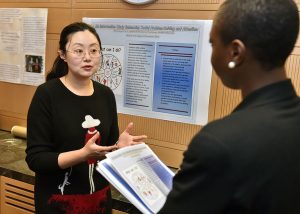
Photo by Dana Maxson
Christine Fountain, PhD, assistant professor of sociology, and Rebecca Sanchez, PhD, assistant professor of English, also presented.
Fountain is doing research with scientists from Columbia University and the Centers for Disease Control and Prevention on the sociological aspects of autism, particularly how a noncontagious illness has reached epidemic proportions and who is being most severely affected by it.
Autism, the group has found, is more prevalent in children of wealthy and well-educated parents, and that wealth and education play a role in how quickly and to what extent an autistic child improves developmentally.
Sanchez discussed her new book Deafening Modernism: Embodied Language and Visual Poetics in American Literature (New York University Press, 2015), which argues that “deaf insight,” that is, the “embodied and cultural knowledge of deaf people,” is not an impairment, but an alternative way of thinking and communicating.
She offered the example of Charlie Chaplin’s 1936 silent film Modern Times. Chaplin, Sanchez said, deliberately chose to avoid the new “talkie” technology because silent pictures allowed for “a universal means of expression.” The plot of the film itself, she said, bespeaks the dangers of forcing people to express themselves in homogenized ways.
The event also included poster presentations by two doctoral students, Xiaoming Liu and Rachel Podd, and Navena Chaitoo, FCRH ’13.
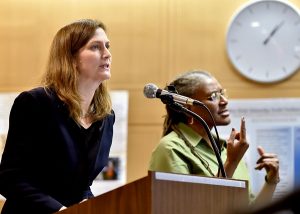
Photo by Dana Maxson
Elizabeth Emens, PhD, the Isidor and Seville Sulzbacher Professor of Law at Columbia Law School, offered the keynote presentation, “Disability Law Futures: Moving Beyond Compliance.”
The event was sponsored by the Office of Research and by the Faculty Working Group on Disability, led by Sophie Mitra, PhD, associate professor of economics. The group connects Fordham faculty who are researching some aspect of disability.
]]>According to an interdisciplinary panel of Fordham faculty members who presented their research on Nov. 30, they all serve to help individuals recover, create or empower themselves through community.

The panel was part of “Creating Community,” the second in this year’s Growing Research at Fordham series designed to highlight quality scholarship being done by the University faculty.
The creative genius of one artist helped to broaden the spiritual and religious colony of Taizé into a worldwide community, said Judith Kubicki, Ph.D., professor of theology.
Brother Roger Schutz founded the colony in France during World War II as a safe haven for Jews and refugees. Its liturgical music, written by Jacques Berthier, helped to break down the barriers of language, culture, politics, ethnicity and education, creating a sense of unity and identity among its worshipers and attracting people from many nations.
Today, more than 100,000 people make a pilgrimage annually to Taize, which thrives as a worldwide ecumenical community dedicated to peace and social justice.
“Roger Schutz desired to heal the wounds of alienation and brokenness that were so evident in splintered Christianity and Europe as a result of World War II,” Kubicki said. “Berthier’s music and the process of creating and revising it contributed to the building of community.”
Micki McGee, Ph.D., associate professor of sociology, studied Yaddo—a community stocked with artistic geniuses—and its members’ social relationships. She created a digital mapping tool to measure the impact of friendships between such artists as Carson McCullers, Lewis Mumford and Truman Capote. Then she discovered other academics that were studying similar artistic communities, such as Greenwich Village artists from the 1920s and 20th century philosophers—all with different mapping platforms.
“I thought, ‘Wouldn’t it be cool if all of our data could play well together?’” she said.
McGee has received a grant from the National Endowment of the Arts to create the Compatible Data Initiative, a project working toward universal digital mapping protocols.

Twentieth century utopian communities were the focus of research by Rosemary Wakeman, Ph.D., professor of history and director of the urban studies program. The devastation of World War II, coupled with a terrible housing crisis, led to the creation of “new towns”—utopian communities that promised a closed community of peace, harmony and social justice.
These were “inward-looking” communities with centrally located schools and other institutions, where mothers could look out their windows and see their children at play, and where fathers could walk to work. The new towns were built on every continent, she said, with 125 of them created in the United States.
Although time has proven that utopian communities are more dream than reality, said Wakeman, the notion that the physical design of towns could somehow alter human behavior was part of the post-World War II healing process.
“This vision of community was absorbed as the core of social reconstruction and was a major influence on the way nations themselves were imagined,” she said.
The recent phenomenon of the two-career family is a new division of labor that is redefining the family community, said Kirsten Swinth, Ph.D., associate professor of history and author of the forthcomingBringing Home the Bacon and Frying It Up Too: A Cultural History of the Working Mother in America, 1950-2000.
In fact, the new working family, said Swinth, has created a new field of study among scholars. The phrase itself wasn’t used until 1986, at which time it was defined as a “problem,” Swinth said. New cultural types, such as the “caring man” depicted on the television show Who’s the Boss, have been introduced as men have lost ground as breadwinners.
Swinth cited the Family and Medical Leave Act of 1993 as a watershed in cultural change, but said that the shift in family roles is still too new to be fully understood.
“The more I think about the working family, the more I hope that it offers . . . terrain for all of us to demand changes from the state and from business [toward]more egalitarian, less-pressured results.”
Fordham’s Office of Research sponsored the event.
]]>
Photo by Bruce Gilbert
At a recent symposium, three Fordham professors took on a direct question: “What are rights, who has them, and why do they exist?”
That was the title of a forum at O’Keefe Commons on the Rose Hill campus, where the three professors—of philosophy, theology and history—exposed the full complexity of a frequently invoked concept. They took questions from faculty in natural sciences, sociology, political science and psychology.
The Office of Research is holding many similar events around the University to promote discussions across disciplines and highlight the research done under Fordham’s faculty development program.
Philosophy professor Michael Baur, Ph.D., J.D., kicked off the Oct. 6 event by addressing the conflict between two views: that rights are inviolable, and that they may be trumped by social needs.
He said an alternative is the classical view: that rights are inviolable, but relational; that is, they can only exist within a system of justice that promotes equal treatment of individuals.
“We can’t begin to talk about rights if we can’t first specify what we mean by justice, and justice always means justice as equal treatment in some relevant respect,” he said.
He drew analogies with weight, which requires gravity, and a dollar, which requires a system of exchange if it is to have any value.
For instance, he said, in this view theft is always wrong, but it’s valid to take from another to help someone who is in danger of dying for lack of aid—“not because violating a right becomes legitimate; because, rather, on the classical account, when one cannot live and another has a surplus, there is no proper relation of equal treatment.”
The next panelist, theology professor Charles Camosy, Ph.D., speaking from the Christian ethicist tradition, said the Catholic Church distinguishes between rights that apply in all situations, and those that can only be understood in a social context.
For instance, he said, in this view there is no context that justifies torture, rape, or killing the innocent. But when the church asserts a right to healthcare, he said, a social context is required.
“If we say that there’s a right to healthcare, and we have limited resources and virtually unlimited health care needs, we need to start making conscious, specific choices, and not let the idol of Western capitalism—that we can have as much as we want, whenever we want—run free rein,” he said. “I hope this is one thing we all took away from the healthcare debate.”
History professor David Myers, Ph.D., the third panelist, made a point about rights by looking to the 17th century.
He told the story of a young woman in the territory of Lower Saxony who, in 1661, was prosecuted for infanticide despite a lack of evidence—no one had ever seen the baby that was allegedly killed—and the torture that was used to elicit a confession.
She was convicted of a lesser charge, publicly whipped, and sent into exile. Her lawyer’s vigorous claims about the rights of the accused continued to resonate, however, eventually finding their way into pre-Enlightenment legal treatises throughout the Holy Roman Empire.
He told the story to show rights as an achievement and an ongoing project.
The lawyer “didn’t change the world, he didn’t get his client off the hook, he didn’t get $30 million for the family,” Myers said. “But he did demonstrate what I think to be an important point: No matter how inalienable, no matter how endowed by their creator, no matter how intrinsic to the nature of justice and humanity itself, rights only really exist if someone is willing to go out and defend them.”
]]>“I followed the directions step by step, created my profile and consequently have been getting SMART notices almost daily,” said VanBergeijk, whose research focuses on school-based services for children and child welfare. “Even if it’s not exactly what I’m interested in, it gives me a pulse of what’s going on out there. Sometimes in academia you feel very disconnected, and this process helps you get a sense of what types of research other people are willing to fund.” In addition to grants, VanBergeijk uses the software to investigate additional research options. “The software also announces opportunities to teach and do research overseas which is something that I’ve always wanted to do,” said VanBergeijk. “Now I know how to go about the process, where as before, I had no idea where to begin.” The University is currently conducting a national search for a new director of the Office of Research and Sponsored Programs. According to Cosgrove, there are other areas that can be further developed. For example, he says a comprehensive manual for faculty members with a set of policies that they can use to help navigate through the complex, business related aspects of their research should be developed.
]]>